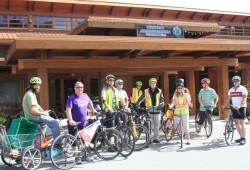Dianne and Dave Ignace chuckled at the sight of Gord Johns cycling along the concrete seawall after the Member of Parliament disembarked at Hesquiaht Harbour on Monday. As year-round residents of the traditional Hesquiaht village for 42 years, the Ignaces can’t recall another time an MP came to the remote site, which currently has just four permanent residents.
“We met him years ago,” recalled Dave.
“We spent the night on his floor once in Chesterman Beach when we were storm-bound and couldn’t get home,” added Dianne.
This time Johns was the visitor, a stop that began his 13-day Ride the Riding tour of promoting the need for a national cycling strategy. After Hesquiaht Harbour, Johns travelled by boat to Hot Springs Cove and Ahoushaht. His tour also brought the bike to Ty-histanis, Macoah, Hitacu and Anacla, before visiting the Hupacasath and Tseshaht reserves in Port Alberni.
”I’m fighting for everyone, all the nations and all the communities in our riding, so I thought it would be appropriate to start the Ride the Riding tour in the farthest place from Ottawa, which is Hesquiaht,” said Johns during a visit to the Tseshaht administrative building on the Somass River.
The MP sees the visits as an important effort to build trust in the government among Nuu-chah-nulth-aht –particularly in the more isolated communities where subsistence can be a challenge. The Hesquiaht were enjoying their annual week of camping on the traditional territory when Johns visited, which allowed Chief Councillor Richard Lucas to explain to the MP why the federal government relocated the First Nation from Hesquiaht Harbour years ago.
“They thought it was better if they moved us to Hot Springs for our fish boats, because every year we lost one or two boats and had to buy another one,” explained Lucas.
Johns’ visits to reserves highlighted the importance of an ongoing court case between Nuu-chah-nulth Nations and the Government of Canada over fishing rights, as well as efforts to preserve traditional language, care for elders as well as infrastructure investments in small coastal communities.
“It’s $50 each way to Hot Springs in a water taxi and you’re surviving on $235 a month, you can’t catch the fish that are running right by your village and sell it - to see this kind of injustice has been a real learning experience,” said Johns. “We need to do more to make sure that the people in these communities are represented and find a way for communities to thrive.”
Following the prime minister’s Aug. 5 meeting with Nuu-chah-nulth chiefs in Tofino, Johns observed that Justin Trudeau is an improvement over his predecessor’s relationship with West Coast First Nations. But now action is needed from Ottawa, he said.
“I was humbled with the amount of gratitude that the nations showed me, but also embarrassed that it took two years for me to lobby the prime minister and 150 years of the existence of this country to have the prime minister meet with the Nuu-chah-nulth people,” said Johns. “Is he doing a good job? We’ll have to assess that when we see action.”








